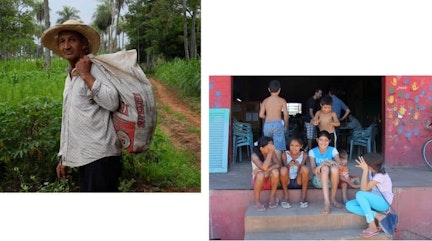Perspectives

What’s the story behind Lemonaid and ChariTea?
We started the Lemonaid and ChariTea project ten years ago to show the world that business can be a force for good. We make a range of soft drinks and iced teas that not only taste great but also ignite social change. On top of sourcing only Fairtrade and organic certified ingredients, each bottle sold donates an additional 5p to the Lemonaid & ChariTea Foundation. To date, the Foundation has received more than £4m and currently supports over 30 social development projects – from solar energy to education – in the countries where the ingredients are grown.
How is your project different from a traditional business or charity?
Having experienced the shortcomings of traditional development aid, we wanted to create a self-sustaining social business model rather than having to constantly fundraise for donations. Our goal has always been to provide long-term support to smallholder farmers and their communities in the Global South. We believe the best way of empowering them is through changing trade – by paying fair prices as well as providing access to international markets and the security of long-term contracts.
We don’t believe in the black-and-white narrative that companies exist solely to benefit their shareholders while charities can alleviate the social injustices done to producing countries in the process. Every business has the moral obligation to be a good citizen and take responsibility for its actions. We’ve always championed the belief that business can be based on ethical principles and be successful – it is possible to have both.

Sri Lanka: Idulgashena tea farming cooperative and Diyanilla Technical Institute social project
What types of social project does the Foundation support?
Our drinks project was founded on the principles of social entrepreneurship which combines a financially viable product with a charitable purpose. We’re convinced that this concept also exists in other parts of the world. The Lemonaid & ChariTea Foundation therefore sets out to support initiatives that build on and develop local entrepreneurial potential and capability.
The goal is to support the creation of value chains to help produce independent sources of income. We help communities in economically underprivileged parts of the world – for instance, by investing in their education, granting microloans, and improving infrastructure, healthcare and food supply. This is achieved in cooperation with local partners in South Africa, Sri Lanka, Mexico, Paraguay, Argentina, India and Rwanda – countries where the ingredients for Lemonaid and ChariTea are sourced.

Paraguay: Asocace Sugar farming cooperative and Centro de Apoyo social project
How can you sustain in a competitive marketplace that’s largely dominated by big brands?
Our customers understand the value of what we do and are willing to pay a slightly higher price for a soft drink that isn’t loaded with refined sugar, doesn’t harm the environment and treats everyone – right down to the tea picker – fairly and with dignity. More and more consumers care about the impact their lifestyle has on people living on the other side of the world and want to make a positive contribution through conscious consumption. We’re giving them the chance to do so, drink by drink.
I believe this level of authenticity and customer loyalty is difficult to achieve for larger brands that are part of multinational corporations. Consumers have learned to differentiate between green marketing campaigns that promise the world but do little and companies that transparently put their money where their mouth is.







